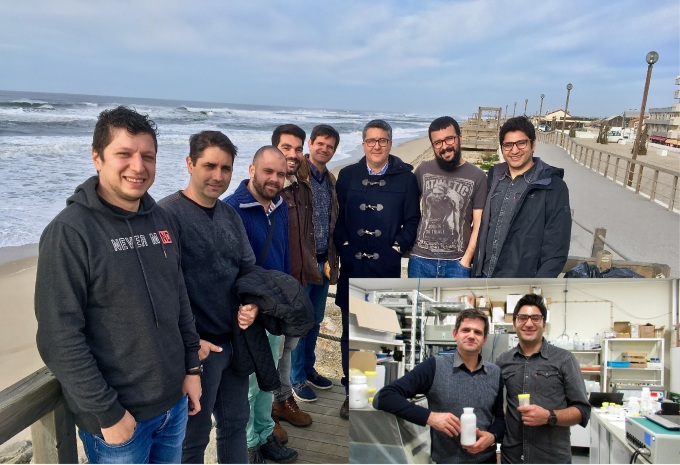Young Scientist from HZG on a Research Visit to University of Aveiro, Portugal

Photo: HZG/Zahid M. Mir
Work Summary
The chloride induced corrosion of steel inside concrete is a severe problem concerning infrastructure worldwide. Chloride ion from the environment pass through the concrete matrix, reach to the steel reinforcement depth and cause “Depassivation” of the reinforcing steel, thereby initiating corrosion. Innovative mechanics that can slow the ingress of chloride ions in concrete can increase the time to corrosion initiation and therefore increase the service life of concrete structural members. The purpose of the research exchange to University of Aveiro in Portugal was to investigate the addition of novel chloride entrapping nano-containers (Layered double hydroxides) inside concrete.
Layered double hydroxides (LDH) are formed by the co-precipitation of bimetallic hydroxides with a molecular arrangement of positively charged brucite layers and negatively charged anions between the layers. LDH possesses a remarkable property of capturing negatively charged anions from its environment by releasing another negatively charged anion from its intra-gallery. As such, selective ions from the environment can be captured by the LDH and this process is called “ionic exchange”. Due to these ion capture properties LDH have found a broad scope of application from precisely-tailored drug delivery to corrosion protection of airplane components. I plan to use a certain class of LDH and tailor it to be used as a cement additive. The objective is to capture Cl- ion from the concrete pore solution and replace it with a corrosion inhibiting molecule “double self-protection”. This would substantially prolong the service life of the structural member. The purpose of my research exchange to University of Aveiro was to conduct experimental investigations towards the synthesis, stability, exchange kinetics and compatibility of LDH with Calcium rich cement matrix.
My research visit was funded by a research grant from the European Union’s “SARCOS - Self As preventive Repair of COncrete Structures” COST Program. (Grant Number CA15202). I strongly encourage all doctoral students to use the COST initiative to apply for an exchange grant.
My research visit to University of Aveiro was a fantastic window of opportunity to learn new techniques and conduct sophisticated experiments in line with my research work. I interacted with scientists not only from my field but from other fields as well who always contributed with a new insight into my work. Apart from work, I was able to experience Portuguese culture in depth. Portugal is a very rich country in terms of culture, art, nature (especially the sandy white beaches) and food. I had a deeper experience of Portuguese cuisine with my Portuguese friends who knew the right local places to dine. I further polished my Portuguese skills and by the end of my two-month visit, I could understand a lot of Portuguese, enough to hold small conversation. My lab mates were very friendly and made sure that I feel home from the very first day. We played football regularly and I also participated in the Christmas choir. Time passed fast :)
A few tips for students who are planning a research visit abroad:
1. Plan a realistic amount of to-do experiments that would fit the duration of your visit. Be optimistic and realistic! Do not try to achieve everything in a single research visit.
2. Plan you experiments in depth a month before your departure. Schedule a few Skype meetings with your host supervisor who might throw in a few tips from his experience. Make a mental sketch of the publication/conclusion/figures and graphs that you would like to have at the end of your research visit. Plan accordingly.
3. Make a detailed day-wise time table of your experiments, highlight the instrument which you might need and discuss their availability with your host supervisor in advance. If you're going to learn something new, ask for the instruments/materials required and their availability. This will save you a substantial amount of time after your arrival to the new lab.
4. Leave some empty slots in your schedule for unforeseen/supporting experiment.
5. Be flexible to change/modify your regular work routine. Depending on the country you visit, work ethics change a LOT. If you are an early bird at work, you might find your new lab closed in the new University. This happened to be my case, as my particular lab in Portugal used to open as late as 10:00 am (or as early as 10:00 am). Be flexible, productivity will follow up.
6. Treat your data as soon as you can. Make a daily habit of analysing your data at the end of the day so that you can have a quick discussion with your host supervisor the next day. Remember you have limited day at your new lab and your host supervisor won’t be around after the exchange visit is over. This can help in foreseeing potential main/conclusion in your work. Supporting experiments regarding a particular conclusion can also be planned in such discussions.
7. Apart from your own lab, try to network with scientists from other labs. They can contribute with a different insight about a topic and it will also pave a path for more collaborations in the future.
8. Your research visit is mutual benefit to you and to your supervisor. Try to build a strong collaboration with your new lab and plan collective research for the future ahead. They might be kind enough to give you a reference letter by the end :)
9. Apart from generating huge amounts of data, considerable sweet memories will find their way to you. Make a nice picture with all lab members at the end of your visit.
*Author Details: Department of Corrosion and Surface Technology (WZK), Helmholtz-Zentrum Geesthacht (zahid.mir@hzg.de)

